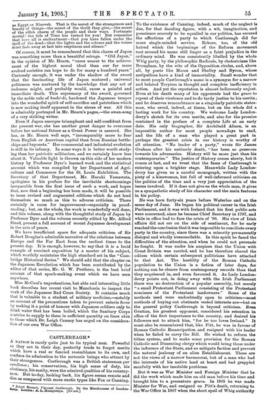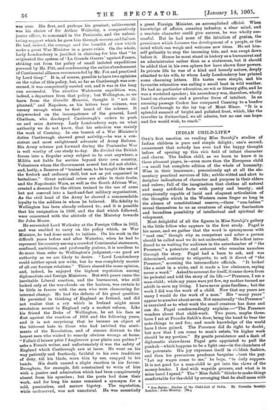A NATION is rarely quite just to its typical men.
Powerful as they are in their day, posterity tends to forget merits which have a real or fancied resemblance to its own, and confines its admiration to the meteoric beings who attract by their strangeness. Castlereagh was a British statesman par excellence ; his conservatism, his high sense of duty, his obstinacy, his sanity, were the admired qualities of his country- men. But to-day, looking back, his figure seems remote and dim as compared with more exotic types like Fox or Canning.
.• Robert Stewart, Viscount Castlereagh. By the Marchioness of London- 111401. London A. L. Humphreys. [3/6 not.] To the existence of Canning, indeed, much of the neglect is due, for that dazzling figure, with a wit, imagination, and prescience scarcely to be equalled in our politics, has secured the affections of a party to which Castlereagh did far more single-minded service. Echoes, too, of the old hatred which the beginnings of the Reform movement cast around his name still linger as a faint prejudice in the ordinary mind. He was consistently libelled by the whole Whig party, by the philosophic Radicals, by rhetoricians like Brougham, by the wits of the Opposition circles, and, above all, by poets like Moore and Shelley and Byron, whose antipathies have a kind of immortality. Small wonder that to most people Castlereagh's name is a synonym for a narrow and belated Toryism in thought and complete inefficiency in action. And yet the reputation is almost ludicrously unjust. Even at his death many of his opponents had the grace to repent of their virulence and to do tardy justice to his merits ; and he deserves remembrance as a singularly patriotic states- man, who erred, indeed, at times, but on the whole did a lasting work for his country. We welcome Lady London- derry's sketch for its own merits, and also for the promise contained in the preface of a complete Life at an early date. His only biographer, Sir Archibald Alison, is an impossible author for most people nowadays to read, and the life of a man who played a great part in perhaps the greatest crisis in our history is worthy of all attention. " No leader of a party," wrote Sir James Graham after his untimely death, " has been so generous towards his adversaries. History will be more just than his contemporaries." The justice of History comes slowly, but it comes at last, and we trust that the fame of Castlereagh is entering upon a brighter stage. Meanwhile Lady London- derry has given us a careful monograph, written with the piety of a kinswoman, but full of well-informed criticism on the politics of the time and a very just appreciation of the issues involved. If it does not give us the whole man, it gives us a sympathetic study of his character and the main features in his policy.
He was born forty-six years before Waterloo and on the same day of June. He began his political career in the Irish Parliament, and it was with Ireland that his first public acts were concerned, since he became Chief Secretary in 1797, and while in office had to face the crisis of '98. His view of Irish affairs did not err on the side of sentiment, for he early reached the conclusion that it was impossible to conciliate every party in the country, since there was a minority permanently disloyal and wholly irreconcilable. In this spirit he faced the difficulties of the situation, and when he could not persuade he fought. It was under his auspices that the Union with Great Britain was carried, and he has therefore shared the odium which certain subsequent politicians have attached to that Act. The hostility of the Roman Catholic population to the Union is a fiction of later days, for nothing can be clearer from contemporary records than that they acquiesced in, and even favoured it. As Lady London. deny points out, in doing away with the Irish Parliament there was no destruction of a popular assembly, but merely "a small Protestant Parliament consisting of the Protestant nominees of the Protestant landowners." Some of the methods used were undoubtedly open to criticism—most methods of buying out obstinate vested interests are—but on the general policy Castlereagh is beyond criticism. Even Grattan, his greatest opponent, considered his retention in office of the first importance to the country, and desired his followers not to attack him, "for he too loves Ireland." It must also be remembered that, like Pitt, he was in favour of Roman Catholic Emancipation, and resigned with his leader when he failed to carry the Bill. He wished to reform the tithes system, and to make some provision for the Roman Catholic and Dissenting clergy which would bring them under the influence of the State, and so mitigate faction and prevent the natural jealousy of an alien Establishment. These are not the views of a. narrow bureaucrat, but of a man who had the interests of his native land at heart and had grappled manfully with her insoluble problems.
But it was as War Minister and Foreign Minister that he did the work which made him an old man before his time and brought him to a premature grave. In 1805 he was made Minister for War, and resigned on Pitt's death, returning to the War Office in 1807 when the short spell of Whig authority was over. His first, and perhaps his greatest, achievement was his choice of Sir Arthur Wellesley, a comparatively junior officer, to command in the Peninsula, and the unhesi- tating support which he gave him through success and failure. He had, indeed, the courage and the breadth of view which make a great War Minister in a grave crisis. On the whole, Lady Londonderry is justified in claiming for him that "he originated the system of ' La Grande Guerre' against France, striking out from the policy of small isolated expeditions pursued by Mr. Pitt, and condemning the entire abandonment of Continental alliance recommended by Mr. Fox and practised by Lord Grey." It is, of course, possible to have two opinions on the value of this policy, but, so far as Castlereagh was con- cerned, it was competently carried out, and it was in the long run successful. The abortive Walcheren expedition was, indeed, a departure from that policy ; but Wellington, as we learn from the Greville Memoirs, thought it " not ill- planned," and Napoleon, as his letters bear witness, was uneasy enough when be first heard of the scheme. It shipwrecked on the incompetence of the general, Lord Chatham, who disobeyed Castlereagh's orders to push on and seize Antwerp. Lady Londonderry says, on what authority we do not know, that his selection was mainly the work of Canning. In one branch of a War Minister's duties Castlereagh showed great activity,--he was a con- sistent and most enlightened advocate of Army Reform. His Army scheme put forward during the Peninsular War is well worthy of our study to-day. He divided the British forces into a Regular army subject to be sent anywhere, a Militia not liable for service beyond their own country, Volunteers whom the Government armed but did not clothe, and, lastly, a Reserve of " trained men, to be taught the use of the firelock and ordinary drill, but not as yet organised in battalions." Great national crises are alike in their fruits, and the Napoleonic Wars, as well as the South African War, created a demand for the citizen trained to the use of arms but not coerced into a hard-and-fast military organisation. As the civil head of the Army he showed a commendable loyalty to the soldiers in whom he believed. His fidelity to Wellington has been already referred to ; and it is possible that his resignation in 1809, and the duel which followed, were concerned with the attitude of the Ministry towards Sir John Moore.
He succeeded Lord Wellesley at the Foreign Office in 1812, and was enabled to carry on the policy which, as War Minister, he had done much to initiate. On his work in the difficult years before and after Waterloo, when he had to represent his country among a crowd of Continental statesmen, confused, ambitious, and profoundly jealous, it is needless to do more than refer to Wellington's judgment,—as good an authority as we are likely to desire. " Lord Londonderry could neither speak nor write, but he was completely master of all our foreign relations." Thiers shared the same opinion, and, indeed, he enjoyed the highest reputation among diplomatists and foreign Ministers. But with peace came the inevitable Liberal reaction, and the bureaucrat, who still looked only at the war-clouds on the horizon, was certain to be little in favour with the men who were clamouring for internal change. He had the defects of his great qualities. He persisted in thinking of England as Ireland, and did not realise that a cry which in Ireland might mean revolution meant in England only a modest reform. Like his friend the Duke of Wellington, he set his face as lint against the reaction of 1816 and the following years, and it is not surprising that he became an object of the bitterest hate to those who had imbibed the senti- ments of the Revolution, and of sincere distrust to the honest men who wished to remedy obvious wrongs at home. " Fallait-il laisser perir l'Angleterre pour plaire aux poetes P " asks a French writer, and unfortunately it was the safety of England which Castlereagh saw at issue. He went on his way patiently and fearlessly, faithful to his own traditions of duty, till his blade, worn thin by use, snapped in his hands. His death caused a slight reaction in his favour. Brougham, for example, felt constrained to write of him with a. justice and admiration which had been conspicuously absent from his speeches ; but the poets had done their work, and for long his name remained a synonym for a cold, passionless, and narrow bigotry. The reputation, while undeserved, was not unnatural. He was essentially a great Foreign Minister, an accomplished official. When knowledge of affairs, amazing industry, a clear mind, and a resolute character could give success, he was wholly suc- cessful. But he had none of the intuition of genius, the prescience which foresees the development of a people, or the mind which can weigh and welcome new ideas. He set him- self gallantly to stop the incoming tide, and was swept down before it. Hence he must stand in history as a bureaucrat and an administrator rather than as a statesman, but it should be added that in his own sphere few have shown finer powers. In private life he was of a kind and homely nature, deeply attached to his wife, to whom Lady Londonderry has printed some charming letters. His tastes were simple, and his favourite relaxation was sailing a small boat in wild weather. He had no particular education, no wit or literary gifts, and he was a wretched speaker; his ascendency was, therefore, wholly based on character and a peculiar force of intellect. In an amusing passage Croker has compared Canning to a bonfire and Castlereagh to the icy top of Mont Blanc. "It is a splendid summit of bright and polished frost, which, like the traveller in Switzerland, we all admire, but no one can hope, and few would wish, to reach."
INDIAN CHILD-LIFE.*







































 Previous page
Previous page